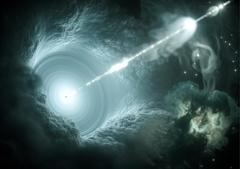Cosmic particle accelerators like blazars (artist's impression) are typical objects for multimessenger astronomy. Credit: DESY, Science Communication Lab
DESY is expanding its activities for the exploration of the high-energy universe. As the new year begins, the research centre, which is a member of the Helmholtz Association, is setting up a new research division for astroparticle physics. The director in charge of astroparticle physics will be Christian Stegmann, who is also the head of DESY’s Zeuthen site. This means that in future DESY will have four research divisions: Accelerators, Photon Science, Particle Physics and Astroparticle Physics.
“Astroparticle physics has developed extremely rapidly in recent years, both at an international level and at DESY. With the establishment of the new research division, we are driving this development further forward,” explains Helmut Dosch, the chairman of DESY’s Board of Directors. “Over the coming years, DESY’s site in Zeuthen is going to be expanded to become an international centre for astroparticle physics. These steps will be a boost for astroparticle physics throughout Germany.”
Astroparticle physics studies high-energy particles from outer space that originate in high-energy phenomena such as supernova explosions and active galactic nuclei. It aims to gain a fundamental understanding of the role of high-energy particles and processes involved in the evolution of the universe, thereby providing important foundations for the search for dark matter and physics beyond the Standard Model of particle physics. It is now possible, for the first time, to measure all the different cosmic messengers – from cosmic rays, through gamma radiation and cosmic neutrinos, to gravitational waves – and to combine this information with observations made in classical astronomy, to paint a new picture of the high-energy universe. The emerging field of such combined observations of different “messengers” is called multimessenger astronomy.
Within astroparticle physics, DESY is currently concentrating on the study of cosmic gamma radiation and high-energy neutrinos from outer space. Neutrinos are lightweight elementary particles that can easily penetrate entire stars and therefore offer a glimpse of regions that are opaque to light and other types of electromagnetic radiation. Both gamma-ray and neutrino astronomy are exceedingly dynamic fields of research, and DESY is one of the leading institutes involved in large international observatories such as the future Cherenkov Telescope Array, CTA, and in upgrading the IceCube Neutrino Observatory at the South Pole. Theoretical astroparticle physics is responsible for the important task of interpreting the data provided by the various different cosmic messengers, and to describe how they are connected.
Within the new astroparticle physics research division, a particular scientific focus lies with the multimessenger programme. Apart from the scientific activities, DESY is setting up an international graduate school for promoting young talents in multimessenger astronomy, sponsored by the Helmholtz Association, in collaboration with partners which include the Humboldt University in Berlin, the University of Potsdam and Israel’s Weizmann Institute.
Stegmann is convinced that, “We are on the threshold of a golden age in multimessenger astronomy. And the breath-taking speed with which spectacular findings have been made in recent years means that launching the new research division of astroparticle physics is a step into the future for DESY. I am very pleased to be in charge of this very active division and to be supervising the next results as its director, results that will contribute to our understanding of the structure of matter, from the universe down to the tiniest elementary particles, and to continuing to develop science in Germany.”
https://astroparticle-physics.desy.de









